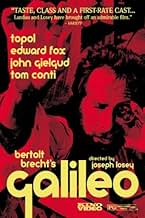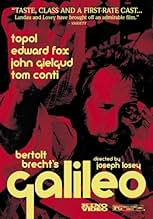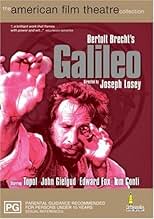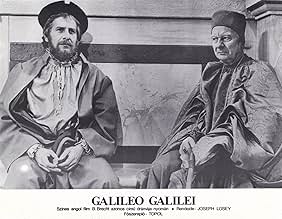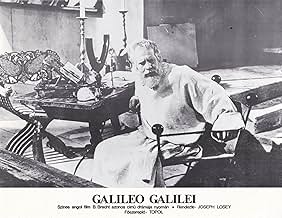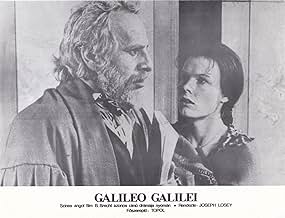यह बायोपिक सत्रहवीं सदी के इतालवी गैलीलियो गैलीली के बारे में है।यह बायोपिक सत्रहवीं सदी के इतालवी गैलीलियो गैलीली के बारे में है।यह बायोपिक सत्रहवीं सदी के इतालवी गैलीलियो गैलीली के बारे में है।
फ़ीचर्ड समीक्षाएं
Joseph Losey's adaptation of Bertold Brecht's controversial play about the famous philosopher and scientist. The story focusses on Galileo's run in with the Catholic Church, who whilst largely accepting his scientific evidence on a number of issues, particularly that the Earth was not a stationary object at the centre of the universe, were not prepared for it to be accepted truth. They simply could not allow this scientific fact to interfere in the order of things, particularly in their view the undermining of god and the church first and foremost.
An exception cast has been pulled together to tell the story and it is an absorbing tale, essentially delivered as a play with no exterior shots to be seen. The cast are universally good, although, I was never entirely convinced by Topol in the lead.
An exception cast has been pulled together to tell the story and it is an absorbing tale, essentially delivered as a play with no exterior shots to be seen. The cast are universally good, although, I was never entirely convinced by Topol in the lead.
This movie opens as a modern-day movie production filming from above the artificial stage lights. The story begins in 1609 Padua. Galileo Galilei (Topol) is a math teacher demonstrating the new Copernican System. Eventually, he comes into conflict with Cardinal Inquisitor (Edward Fox).
This is like a play or at least a staged film. There are those three singing boys introducing each section. After all, it is based on a play. The story unfolds episodically in nature. Some of this may be educational. The general story is familiar to me. This British film is filled with solid actors, but the tension isn't very high.
This is like a play or at least a staged film. There are those three singing boys introducing each section. After all, it is based on a play. The story unfolds episodically in nature. Some of this may be educational. The general story is familiar to me. This British film is filled with solid actors, but the tension isn't very high.
Have for a long time had a lot of respect for Bertolt Brecht and 'Life of Galileo' is one of his most interesting works, especially from a thematic standpoint. Galileo, his life and observations (ahead of the time in his day) were fascinating and he is still deserving of being a giant influential figure in science and modern physics. Joseph Losey did some very good films, including his work with Harold Pinter and his 'Don Giovanni'. The cast sounded perfect on paper.
They weren't completely on film though, due to the actor who sounded like the perfect choice for their role strangely not working. 'Galileo' is well worth watching and is one despite some big drawbacks one of the better films of the inconsistent American Film Theatre series. As well as one of the more interesting entries, again from a thematic and content standpoint. It is no masterpiece, but there are a lot of good things here in 'Galileo' executed greatly. If one doesn't know of Galileo or know a lot about him, this film has enough to make them intrigued more.
'Galileo' is made with an appealing visual style, with grander sets than the usual ones for the American Film Theatre films and the photography is expansive enough without being overblown. Visually and dramatically, of all the play to film adaptations of the series 'Galileo' is one of the least stagebound. Losey directs with restraint but with confidence, he seemed an odd choice for director on paper as this is different territory for him but he does very well. The script is intelligent without being wordy.
A script too that expertly shows what made Galileo so fascinating, what made his findings so important in the development of science and the challenges he had to face. The story is intelligently done and gutsy on the whole and as said it makes one want to know more about the man. The themes of the play are handled well with some genuine tension in the conflict, and actually it was not so bad a thing that the political elements weren't largely emphasised (they're far from absent though) in my view. The Pope and Inquisitor scene is hair raising. 'Galileo' does stray from the facts, but through no fault of the film as Brecht never intended the play to be a biopic. The cast on the whole are very good, with some expertly controlled and authoritative acting.
With one big exception, as much as it pains me to say it. Can understand completely the criticisms for Topol's Galileo and do agree. Will say right now that there have been criticised performances in film history that to me are nowhere near as bad as cited. There was another performance in the American Film Theatre series that got a good deal of criticism, Lee Marvin in 'The Iceman Cometh'. Actually found him very admirable in his role, and he was against type whereas Galileo sounded tailor made for Topol. Who has the physique but sadly neither the heft or the subtlety, he brought those in 'Fiddler on the Roof' so what happened.
It doesn't help though that the film also misses the point of the character in the play, he is written and portrayed as too sympathetic (or that's how it came across, and this was the case more than once in the play's performance history) whereas Brecht intended for him to be a condemnation. Furthermore, while understanding what their role in the film was meant to be, kind of a Greek chorus explaining events and motivations, the choir did feel out of place and interrupted the action rather than moved it on. A few scenes went on for too long and felt like padding.
Summing up, a few big problems but a lot of strengths. Pretty good and in the better half of the series. 7/10.
They weren't completely on film though, due to the actor who sounded like the perfect choice for their role strangely not working. 'Galileo' is well worth watching and is one despite some big drawbacks one of the better films of the inconsistent American Film Theatre series. As well as one of the more interesting entries, again from a thematic and content standpoint. It is no masterpiece, but there are a lot of good things here in 'Galileo' executed greatly. If one doesn't know of Galileo or know a lot about him, this film has enough to make them intrigued more.
'Galileo' is made with an appealing visual style, with grander sets than the usual ones for the American Film Theatre films and the photography is expansive enough without being overblown. Visually and dramatically, of all the play to film adaptations of the series 'Galileo' is one of the least stagebound. Losey directs with restraint but with confidence, he seemed an odd choice for director on paper as this is different territory for him but he does very well. The script is intelligent without being wordy.
A script too that expertly shows what made Galileo so fascinating, what made his findings so important in the development of science and the challenges he had to face. The story is intelligently done and gutsy on the whole and as said it makes one want to know more about the man. The themes of the play are handled well with some genuine tension in the conflict, and actually it was not so bad a thing that the political elements weren't largely emphasised (they're far from absent though) in my view. The Pope and Inquisitor scene is hair raising. 'Galileo' does stray from the facts, but through no fault of the film as Brecht never intended the play to be a biopic. The cast on the whole are very good, with some expertly controlled and authoritative acting.
With one big exception, as much as it pains me to say it. Can understand completely the criticisms for Topol's Galileo and do agree. Will say right now that there have been criticised performances in film history that to me are nowhere near as bad as cited. There was another performance in the American Film Theatre series that got a good deal of criticism, Lee Marvin in 'The Iceman Cometh'. Actually found him very admirable in his role, and he was against type whereas Galileo sounded tailor made for Topol. Who has the physique but sadly neither the heft or the subtlety, he brought those in 'Fiddler on the Roof' so what happened.
It doesn't help though that the film also misses the point of the character in the play, he is written and portrayed as too sympathetic (or that's how it came across, and this was the case more than once in the play's performance history) whereas Brecht intended for him to be a condemnation. Furthermore, while understanding what their role in the film was meant to be, kind of a Greek chorus explaining events and motivations, the choir did feel out of place and interrupted the action rather than moved it on. A few scenes went on for too long and felt like padding.
Summing up, a few big problems but a lot of strengths. Pretty good and in the better half of the series. 7/10.
Needless to day Galileo, look where we are now. I applaud your work and your dedication to the truth it has changed my future immensely. Sadly, the same can't be same for this film. If there was ever a film that you needed to use as a weapon of mass destruction against an unknown foe, Joseph Losey's Galileo would be my number one pick. By doing this you would ensure victory to your team by forcing your opponents to fall asleep. Galileo was the dullest piece of film I have ever encountered. From the acting to the irritating boys singing before every scene was just pure rubbish. This biography did nothing but uproot past High School science reports about this genius. It presented nothing new and nothing exciting. It was genetic cross between a classic British mini-series and one of those friends that never seems to get the hint that they are talking way too much. It was a disaster that would probably, in today's standards, put Galileo back into house arrest.
The role of Galileo was played an interesting actor by the name of Topol. New to this generation's work, I wasn't sure who Topol was until I watched this film. For those of you who do not know, he is a mix between an insane street urchin and a bearded John Belushi. His actions in this film seemed random and rabid at the same time. I never knew what he was going to do or say next, half due to the poor quality in sound, but also because Topol never looked scripted. I guess this is a good thing because it gave some realism to the scene, but it destroyed his character. I kept seeing Galileo as insane instead of brilliant. I know some will argue that Galileo was insane, but when I read about him I just couldn't picture him as one of those screwball geniuses. I always felt he was the real deal, just misunderstood. Topol's delivery of Galileo is longwinded in the sense that he talks more about his actions than just doing them. There seemed to be a lot of this going around in the film, but I will get into that later. Honestly, I wasn't impressed with Topol's performance in this film. I need to see him in more before I make my final decision on his acting ability, but Galileo was not his cup of tea. Outside of Topol, I didn't care about any of the other characters or really fully understand who they were. The lack of character development (odd in a three hour film) and poor sound (outside of the singing kids) only pulled me further away from the rest of the cast. They were just not up to quality standards.
While researching this film, I read by another reviewer about the reasoning for the American Film Theater to make this style of movie. In the mid 70s the organization released several of their plays to the silver screen for their members. As a chance to capture more people to their plays, they offered these subscriptions with six tickets to other films that they had released. The strange aspect about these movies is that they are not filmed as if the actors are on a stage, nor do they carry a lavish budget. They use some fancy (for the time) camera work to highlight some emotions in the characters, but that is it. The rest is cheap and claustrophobic scenery that would immediately turn the novice moviegoer away. Perhaps during this era this was considered amazing cinematography and set design, but in my eyes it just seems shoddy and poor. For this film to work well there needed to be less conversation, more involvement by other characters, and less singing. I didn't see this film labeled as a musical (and I understand why the kids sang to help guide the audience throughout the film as in a play), so I didn't need the twenty minute sexually driven dance sequence in the middle. It was as if it was put in there for the men in the audience that had patiently been waiting through this film (forcing their eyes to remain open) as an added benefit. Suddenly everyone was awake, just in time for the second act. GRRRRRRR.
Overall, this film put me to sleep several times before it was over. It was not the biography I was hoping for on this acclaimed scientist. As a period piece film it failed and as a 'courtroom drama' it failed as well. The actors seemed like they were overacting for film because they were used to the theater productions. Infants did the camera work and the singing kids who introduced the scenes should have been put out of their misery. At least wait till someone has hit puberty to get them singing! Jeesh. If the American Theater wanted this to attract others to their productions, they should have filmed it on a stage, it would have created a better atmosphere and tone. Topol, I hope to see you in better down the road, but until then, stay far away from science.
Grade: * out of *****
The role of Galileo was played an interesting actor by the name of Topol. New to this generation's work, I wasn't sure who Topol was until I watched this film. For those of you who do not know, he is a mix between an insane street urchin and a bearded John Belushi. His actions in this film seemed random and rabid at the same time. I never knew what he was going to do or say next, half due to the poor quality in sound, but also because Topol never looked scripted. I guess this is a good thing because it gave some realism to the scene, but it destroyed his character. I kept seeing Galileo as insane instead of brilliant. I know some will argue that Galileo was insane, but when I read about him I just couldn't picture him as one of those screwball geniuses. I always felt he was the real deal, just misunderstood. Topol's delivery of Galileo is longwinded in the sense that he talks more about his actions than just doing them. There seemed to be a lot of this going around in the film, but I will get into that later. Honestly, I wasn't impressed with Topol's performance in this film. I need to see him in more before I make my final decision on his acting ability, but Galileo was not his cup of tea. Outside of Topol, I didn't care about any of the other characters or really fully understand who they were. The lack of character development (odd in a three hour film) and poor sound (outside of the singing kids) only pulled me further away from the rest of the cast. They were just not up to quality standards.
While researching this film, I read by another reviewer about the reasoning for the American Film Theater to make this style of movie. In the mid 70s the organization released several of their plays to the silver screen for their members. As a chance to capture more people to their plays, they offered these subscriptions with six tickets to other films that they had released. The strange aspect about these movies is that they are not filmed as if the actors are on a stage, nor do they carry a lavish budget. They use some fancy (for the time) camera work to highlight some emotions in the characters, but that is it. The rest is cheap and claustrophobic scenery that would immediately turn the novice moviegoer away. Perhaps during this era this was considered amazing cinematography and set design, but in my eyes it just seems shoddy and poor. For this film to work well there needed to be less conversation, more involvement by other characters, and less singing. I didn't see this film labeled as a musical (and I understand why the kids sang to help guide the audience throughout the film as in a play), so I didn't need the twenty minute sexually driven dance sequence in the middle. It was as if it was put in there for the men in the audience that had patiently been waiting through this film (forcing their eyes to remain open) as an added benefit. Suddenly everyone was awake, just in time for the second act. GRRRRRRR.
Overall, this film put me to sleep several times before it was over. It was not the biography I was hoping for on this acclaimed scientist. As a period piece film it failed and as a 'courtroom drama' it failed as well. The actors seemed like they were overacting for film because they were used to the theater productions. Infants did the camera work and the singing kids who introduced the scenes should have been put out of their misery. At least wait till someone has hit puberty to get them singing! Jeesh. If the American Theater wanted this to attract others to their productions, they should have filmed it on a stage, it would have created a better atmosphere and tone. Topol, I hope to see you in better down the road, but until then, stay far away from science.
Grade: * out of *****
See the Plot Summary to know what this film is about.
Topol with his impatient manner of speech is somewhat insufferable as Galileo. But then, by all accounts, the real Galileo had a touch of arrogance in him and was not very likeable. This movie does not capture the horrors of pre-Industrial Europe, when religious authorities could inflict the most fiendish tortures on any victims they chose. This movie could have made a statement about religion run amok in the social milieu of the day. Instead, it is a bland film lacking dramatic tension. It is a movie adapted from a play and it shows. There is even a chorus of choirboys which is totally out of place. However, there are few bio-pics of great scientists, so this one is worth watching once.
Topol with his impatient manner of speech is somewhat insufferable as Galileo. But then, by all accounts, the real Galileo had a touch of arrogance in him and was not very likeable. This movie does not capture the horrors of pre-Industrial Europe, when religious authorities could inflict the most fiendish tortures on any victims they chose. This movie could have made a statement about religion run amok in the social milieu of the day. Instead, it is a bland film lacking dramatic tension. It is a movie adapted from a play and it shows. There is even a chorus of choirboys which is totally out of place. However, there are few bio-pics of great scientists, so this one is worth watching once.
क्या आपको पता है
- ट्रिवियाJoseph Losey had also directed the original Broadway production of "Galileo," 28 years previously.
- गूफ़After the crier announces Galileo Galilei's recantation, a chessboard is seen on the left side of the screen: all the pieces are upright. As Galileo enters, a new shot shows that one of the pieces has been toppled. In the next shot, all the pieces are again upright (1:57:50-1:58:10).
- भाव
Andrea Sarti: [upon Galileo's recantation] Unhappy is the land that has no heroes.
Galileo Galilei: Incorrect. Unhappy is the land that *needs* a hero.
- कनेक्शनFeatured in Zomergasten: एपिसोड #23.1 (2010)
टॉप पसंद
रेटिंग देने के लिए साइन-इन करें और वैयक्तिकृत सुझावों के लिए वॉचलिस्ट करें
- How long is Galileo?Alexa द्वारा संचालित
विवरण
- रिलीज़ की तारीख़
- कंट्री ऑफ़ ओरिजिन
- भाषा
- इस रूप में भी जाना जाता है
- Galileo Galilei
- फ़िल्माने की जगहें
- उत्पादन कंपनियां
- IMDbPro पर और कंपनी क्रेडिट देखें
- चलने की अवधि
- 2 घं 25 मि(145 min)
- ध्वनि मिश्रण
- पक्ष अनुपात
- 1.85 : 1
इस पेज में योगदान दें
किसी बदलाव का सुझाव दें या अनुपलब्ध कॉन्टेंट जोड़ें


